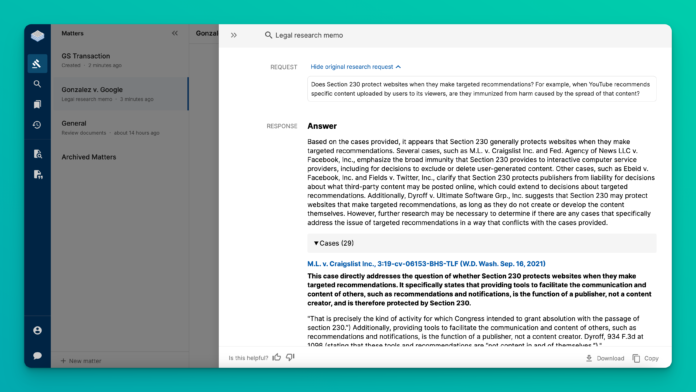

Whether it’s the fact it recently passed the bar exam or is being used as a technology within firms, artificial intelligence is having a major impact on legal practices.
Everywhere you look, AI tools are popping up for law firms and now Casetext has one too. The AI tool CoCounsel was launched by Casetext in March, which is built on OpenAI’s GPT-4, and is customized for legal businesses.
“Essentially, what we’re trying to do here at Casetext, is use these pretty remarkable breakthroughs in generative AI technology to enable lawyers to do their jobs more efficiently,” said Casetext’s Vice President of Client Success Valerie McConnell. “We’ve taken that technology and on top of that, we have built our own software platform that contains a suite of applications for litigators and transactional attorneys.”
For litigators, CoCounsel has applications specific for them that help with legal research and deposition preparation. On the transactional side, it has applications that help attorneys analyze and revise contracts, while determining if their contracts are in line with specified policies. There’s even an application that lets transactional attorneys determine whether a particular type of contractual clause is typical or market-rate. More general applications are for any legal professional and help them search through documents quickly to find information.
CoCounsel allows firms to set up their own private databases on its platform, which then allows practitioners at that firm to search it and ask it specific questions using the AI technology (a law firm cannot search another law firm’s database). When an attorney sets up a database, it’s specific to that attorney and they can choose to share it with others at the law firm they work at. Casetext also has databases that are setup where legal professionals can search primary law materials, but the program doesn’t search the open web.
Users can also upload documents and ask CoCounsel questions about them. The AI will show a spreadsheet showing how it answers each of the questions.
“In addition to being able to ask the AI really tough questions … you can also ask the AI to read a document and determine the emotion of the sender,” McConnell said. “You can ask the AI to find examples where the sender of the email was angry or being sarcastic or was upset or trying to hide something. … No one has to actually say they’re angry.”
McConnell noted the reaction from law firms has been positive.
“They’re pretty blown away,” McConnell continued. “After the initial surprise has worn off, the reaction … tends towards a lot of excitement about how they can employ this technology.”
McConnell said sometimes they do see some fear, especially among junior attorneys who looked through piles of documents or did legal research, about what this means for their job. But McConnell said CoCounsel will help those people do their jobs more efficiently.
“What I tell them … [is] this a really powerful tool, but we still need human lawyers,” McConnell added, who is also an attorney. “A junior lawyer doesn’t have to worry about having his or her job [go] away.”
McConnell added they haven’t seen another company come out with a product like CoCounsel. She did mention Ironclad and LexisNexis also have AI programs.
Aaron Elinoff, a partner at Novo Legal Group, which is an immigrant rights law firm, has been researching AI a lot to see how it can improve their systems and he uses CoCounsel. He said some of it had to do with possibly cutting costs, “but not in the sense of replacing human labor, but rather reducing the amount of human time that needs to go into a task that an AI [program] could do.”
“Our goal is basically [to] leverage AI in order to help more people, take on more cases with our existing staff,” Elinoff continued.
Elinoff noted CoCounsel is good at handling novel issues and how something would be handled in a specific jurisdiction.
“We [can] just punch in the question with all the factual issues and it will basically research and draft a memo,” Elinoff said. “If it’s drafting a legal memo, it will generate a brief summary … that just summarizes the answer to the question you’re asking.”
The program also provides references and brief summaries it relied upon to get to that conclusion.
“It’s extremely accurate in what it provides,” Elinoff said. He noted the way you ask the question is going to dictate the output and the answer it provides, meaning sometimes the prompts the user provides will need to be tweaked if the AI doesn’t answer the specific question the user was looking for.
Elinoff added the document review from CoCounsel is strong for them concerning immigration litigation. For example, Elinoff could go through a database related to a specific country, on a specific issue and age range.
Elinoff is the only one at his firm currently using CoCounsel as they are just getting into it, not knowing how many licenses they would want for different users.
“So far, so good,” Elinoff added. “It’s probably more of an adjustment in our workflow if we were to really maximize usage. It’s one thing to understand what it could do, it’s another thing to actually implement that system into your existing workflow in order to utilize it regularly.”

